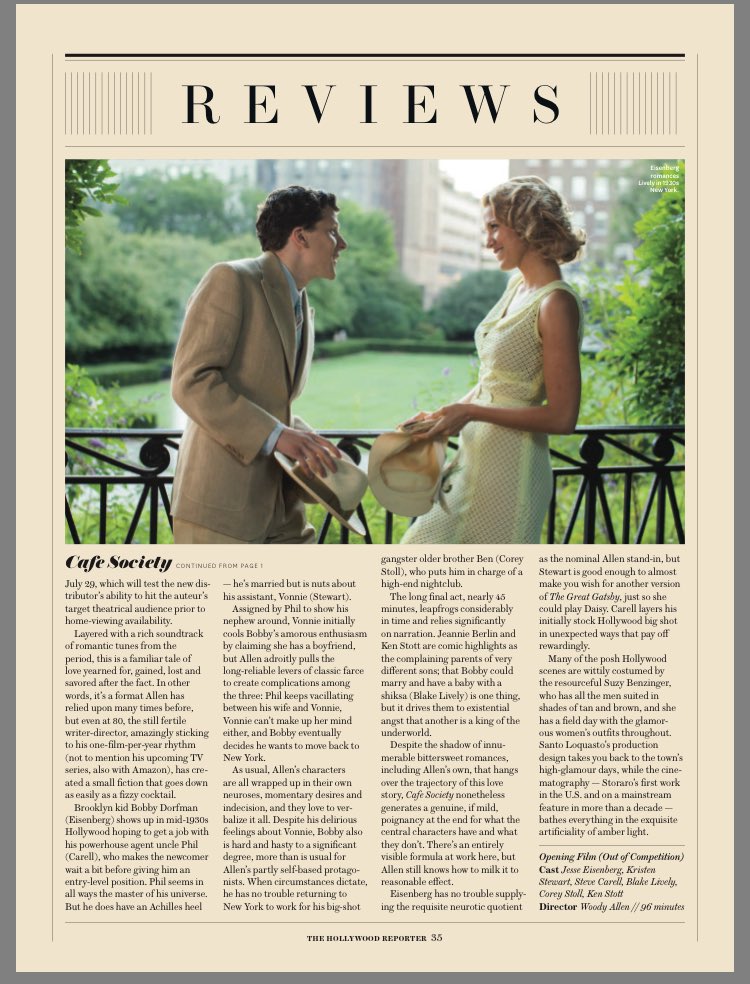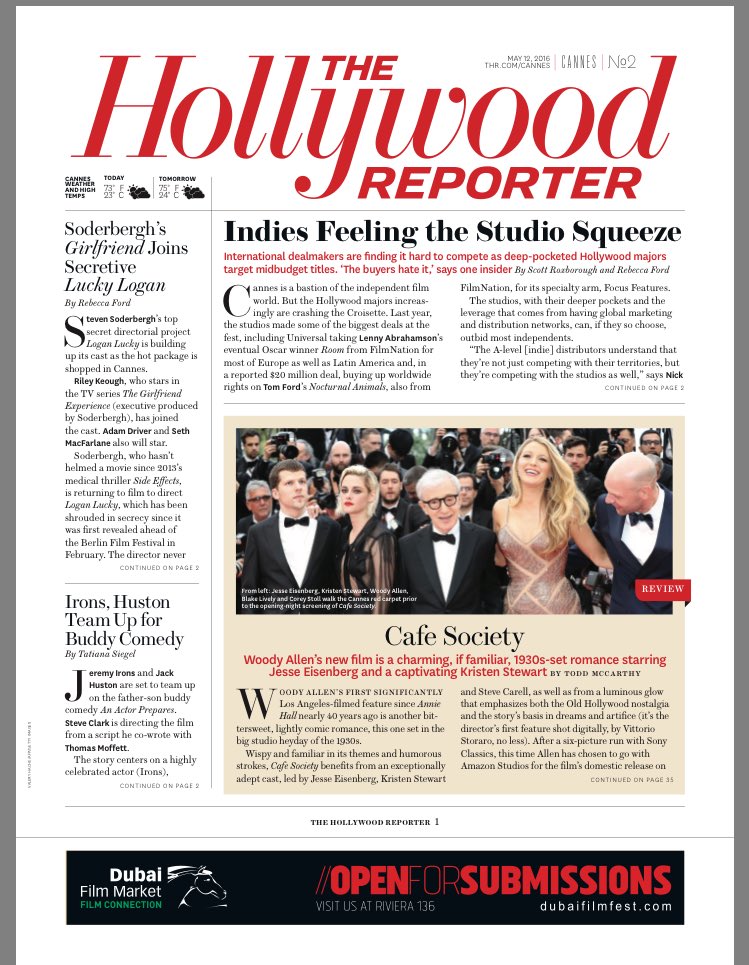Variety
Jesse Eisenberg and Kristen Stewart pair off in Woody Allen's beautiful-looking but overly familiar Hollywood love triangle
Going into a new Woody Allen film, there’s always the hope that it’s going to be major, like “Blue Jasmine,” and not one of his trifles, like the Allen movies that have opened the Cannes Film Festival in recent years (“Hollywood Ending,” “Midnight in Paris”). At this point, however, his track record vastly favors the probability that it’s going to be a trifle, at which point the question then becomes: Will it be one of his good ones — that is, one of those Allen fables that really sings? “Café Society,” starring Jesse Eisenberg as a sweetly naïve Bronx nebbish who journeys to Hollywood in the 1930s to seek his fortune, has been made with all the verve and high-style panache and star magnetism of a small-scale Allen gem. Yet the film, watchable as it is, never quite overcomes the sense that it’s a lavish diagram working hard to come off as a real movie. With intermittent romantic sparks struck between Eisenberg and his co-star, a poised and glowing Kristen Stewart, “Café Society” is likely to draw a larger swath of the Allen audience than his last two, “Magic in the Moonlight” and “Irrational Man.” But there may be a limit to its success, since it’s one of those Allen films that keeps talking about passion instead of actually making the audience feel it.
Eisenberg, looking handsome in wide-pleated pants and a curly pompadour, is the latest in a long line of actors who have been given the obvious directive to channel Allen’s onscreen spirit. But he does a more appealing job of it than most, because the Eisenberg mannerisms – the antic verbal dexterity, the slight sputter of people-pleasing insecurity – match up so organically with Allen’s own. Eisenberg plays Bobby Dorfman, who arrives in Hollywood looking to get a job in the office of his uncle, Phil (Steve Carell), a veteran agent so powerful that he can’t turn around at a pool party without being badgered about some deal he’s negotiating for Ginger Rogers or William Powell. We suspect — or maybe hope — that Phil is going to be the oily player who lures Bobby into his world of corrupt glamor, but Carell, looking appealingly fleshy, plays Phil as a busy, babbly Type A mensch who gives his nephew errands to run and finds the time to introduce him to all the right people.
One of those is Phil’s secretary, Vonnie (Stewart), a willowy but disarmingly level-headed former ingénue who claims to reject the Hollywood game. She takes Bobby on an impromptu tour of celebrity mansions, and they discuss the larger-than-life quality of movie stardom, which prompts Vonnie to insist: “I think I’d be happier being life-size.” Stewart makes you touch the reality of that line. She sheds some of her own halting mannerisms to play a woman of warmth who, with a twinkle, holds her ardor close to the vest, and the mood of quiet confidence fits the actress beautifully. It’s that quality that attracts the guileless Bobby, and it isn’t long before puppy love ensues.
There’s a twist, of course: Vonnie already has a boyfriend — and that lover, it’s revealed early on, is none other than Uncle Phil, who has promised to abandon his wife and marry Vonnie. There’s nothing very original about this love-triangle dilemma, especially in a Woody Allen film, where it directly mirrors so many of the setups in his earlier work, notably the adulterous tangle of “Manhattan.” The question is: Where will he take it this time? And the answer turns out to be: not somewhere very interesting. Carell’s Phil, even though he’s betraying his wife, is portrayed as such a victim of his own romantic devotion that it’s hard to root against him — and Vonnie, in fact, insists that she loves both men. There’s a hint of novelty in the way this plays out against a lusciously visualized period-Tinseltown backdrop. And, indeed, Vittorio Storaro’s scrumptious, dark-toned cinematography is so breathtaking that it almost seems to be telling a story of its own. Storaro, that maestro of color and shadow, turns the wood-paneled offices and restaurants into an Art Deco daydream, and when Bobby and Vonnie are seated in Bobby’s motel room and the electricity goes out, the sudden illumination-by-candlelight looks like something out of “Barry Lyndon.” Every shot in “Café Society” glows with lustrous classicism. Yet all of this just makes you wish that Allen had brought the Old Hollywood setting to life with a richer sense of drama and play, the way that the Coen brothers did recently in “Hail, Caesar!”
If you’re wondering what the title means, “Café Society” refers to the high life back in New York City, where Bobby returns after being spurned by Vonnie. He goes to work in the nightclub owned by his cliché gangster of a brother, Ben (Corey Stoll), and he supposedly finds his place among the swells, but it’s hard to escape the slightly disappointing sense that the movie is starting all over again. And this time, more than ever, it’s telling rather than showing. Allen has chosen to narrate the film himself, which seems like a harmless enough gambit, but his voice, after a while, begins to sound almost syrupy with didactic melancholy, and we can’t help but notice that a lot of the stuff he’s telling us — Bobby gets to know politicians and gangsters! He becomes a man of the world! — should, in fact, have been the very substance of the movie’s plot. Eisenberg’s likable performance never gets a chance to grow; the character development mostly comes down to the fact that in the nightclub, he starts wearing a white tuxedo. He remains that same sweet kid, pining away. By the end, that seems to be the point: that a great many people walk around carrying the ghosts of love – a dream of what might have been. But that’s a message we need to feel in our hearts, rather than our heads, if it’s going to haunt us. Mostly, “Café Society” leaves you dreaming of the movie it might have been had Woody Allen made it by doing what he’s done in his best work: nudging himself out of his comfort zone.
The Hollywood Reporter
Woody Allen’s first significantly Los Angeles-filmed feature since Annie Hall nearly 40 years ago is another bittersweet, lightly comic romance, this one set in the big studio heyday of the 1930s. Wispy and familiar in its themes and humorous strokes, Cafe Society benefits from an exceptionally adept cast led by Jesse Eisenberg, Kristen Stewart and Steve Carell, as well as from a luminous glow that emphasizes both the old Hollywood nostalgia and the story’s basis in dreams and artifice (it’s the director’s first feature shot digitally, by Vittorio Storaro, no less).
After a six-picture run with Sony Classics, this time Allen has chosen to go with Amazon Studios for the film’s domestic release on July 29, which will test the new distributor’s ability to hit the auteur’s target theatrical audience prior to home viewing availability. Layered with a rich soundtrack of romantic tunes from the period, this is a familiar tale of love yearned for, gained, lost and savored after the fact.
In other words, it’s a format Allen has relied upon many times before, but even past the age of 80, the still-fertile writer-director, amazingly sticking to his one-film-per-year rhythm (not to mention his upcoming TV series, also with Amazon), has created a small fiction of amiable appeal and vibrancy which goes down as easily as a fizzy cocktail.
Brooklyn kid Bobby Dorfman (Eisenberg) shows up in mid-1930s Hollywood hoping to get a job with his powerhouse agent uncle Phil (Carell), who makes the newcomer wait a bit before giving him an entry-level position (“We don’t want to emphasize the nepotism,” Phil says in all seriousness). Phil, who bears more than a passing resemblance to legendary agent Charles Feldman (who was Allen’s first Hollywood agent and the producer of What’s New, Pussycat?), can’t utter a sentence without name-dropping and seems in all ways the master of his universe. But he does have an Achilles heel — he’s married, but is nuts about his assistant, the comely young Vonnie (Stewart). Assigned by Phil to show his nephew around (basically showing him a lot of stars’ homes), Vonnie initially cools Bobby’s amorous enthusiasm by claiming she has a boyfriend, but Allen adroitly pulls the long-reliable levers of classic farce to create complications among the three and build pressure in all of them: Phil keeps vacillating between his wife and Vonnie, Vonnie can’t make up her mind either and Bobby eventually decides he wants to move back to New York (the strongest anti-Hollywood sentiment Allen can manage now is having Bobby say, “It’s really a kind of boring, nasty, dog-eat-dog industry”).
All the same, there’s nothing caustic in Allen’s approach here; as usual, his characters are all wrapped up in their own neuroses, momentary desires and indecision, and they love to verbalize it all. Despite his delirious feelings about Vonnie, Bobby is also hard and hasty to a significant degree, more than is usual for Allen’s partly self-based protagonists, so when circumstances dictate, he has no trouble pulling up stakes and returning to New York to work for his big-shot gangster older brother Ben (Corey Stoll), who puts him in charge of a high-end nightclub (hence the film’s title).
The long final act, nearly 45 minutes, leapfrogs considerably in time and relies significantly on narration that sounds like it’s spoken by Allen himself, despite a stilted quality that gives it the feel of something being read cold from a piece of paper. Jeannie Berlin and Ken Stott (the latter could pass as the late Buddy Hackett’s brother) are comic highlights as the complaining parents of very different sons; that Bobby could marry and have a baby with a shiksa (Blake Lively) is one thing, but it drives them to existential angst that another is a king of the underworld. Despite the shadow of innumerable bittersweet romances, including Allen’s own, that hangs over the trajectory of this love story, Cafe Society nonetheless generates a genuine, if mild, poignancy at the end for what the central characters have and what they don’t. There’s an entirely visible formula at work here, but Allen still knows how to milk it to reasonable effect.
Eisenberg has no trouble supplying the requisite neurotic quotient as the nominal Allen stand-in, but Stewart is good enough to almost make you wish for another version of The Great Gatsby just so she could play Daisy, and Carell layers his initially stock Hollywood big shot in unexpected ways that pay off rewardingly. Many of the posh Hollywood scenes are wittily costumed by the resourceful Suzy Benzinger to have all the men suited in shades of tan and brown, and she has a field day with the glamorous women’s outfits throughout. Santo Loquasto’s production design takes you back to the town’s high-glamour days, while the cinematography — Storaro’s first work in the U.S. and on a mainstream feature in more than a decade — bathes everything in the exquisite artificiality of amber light.
Bilder via Twitter


